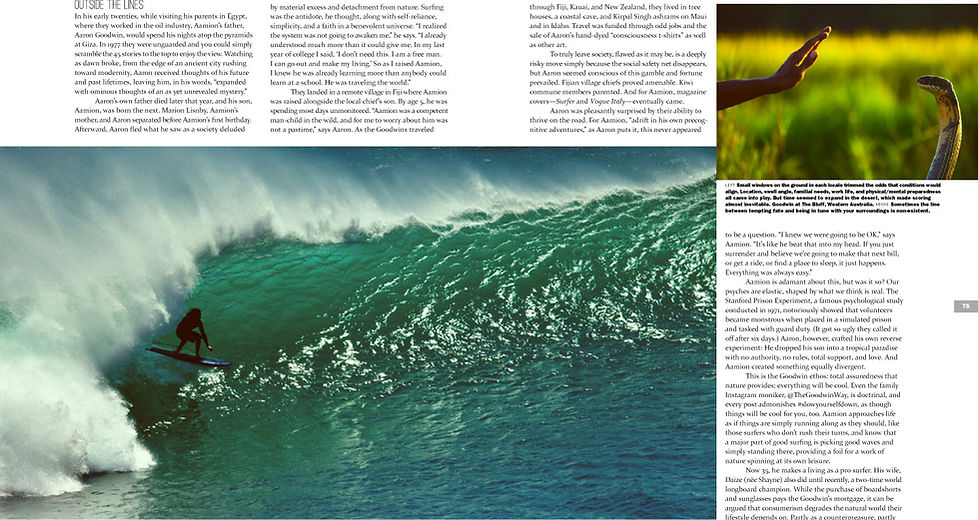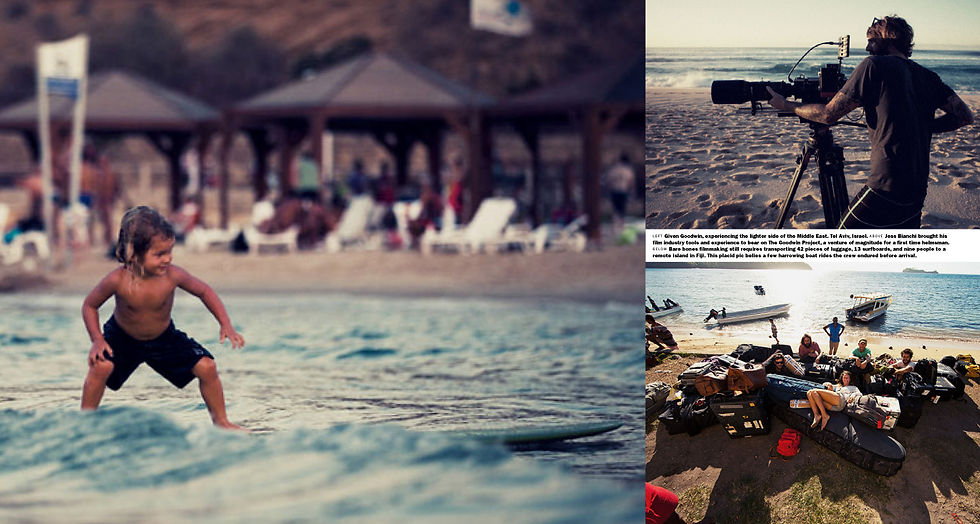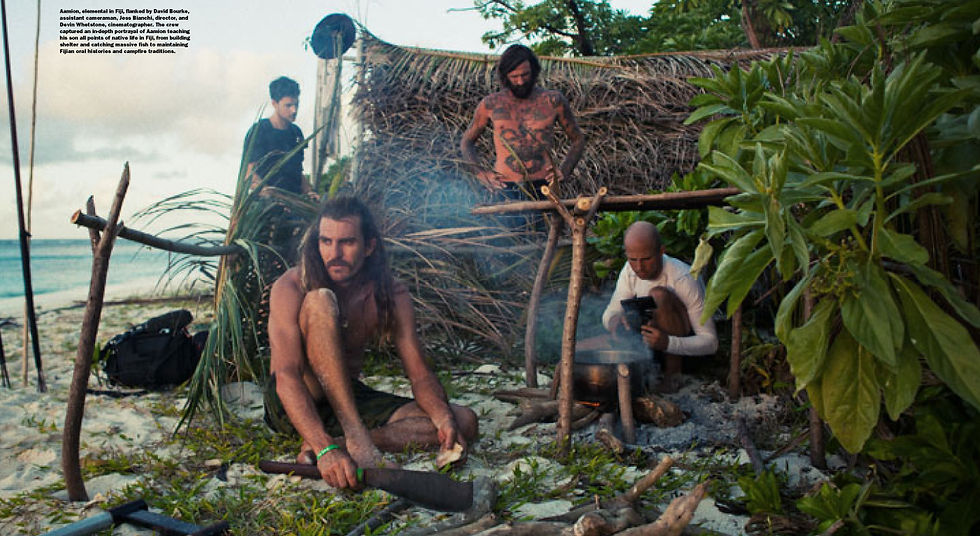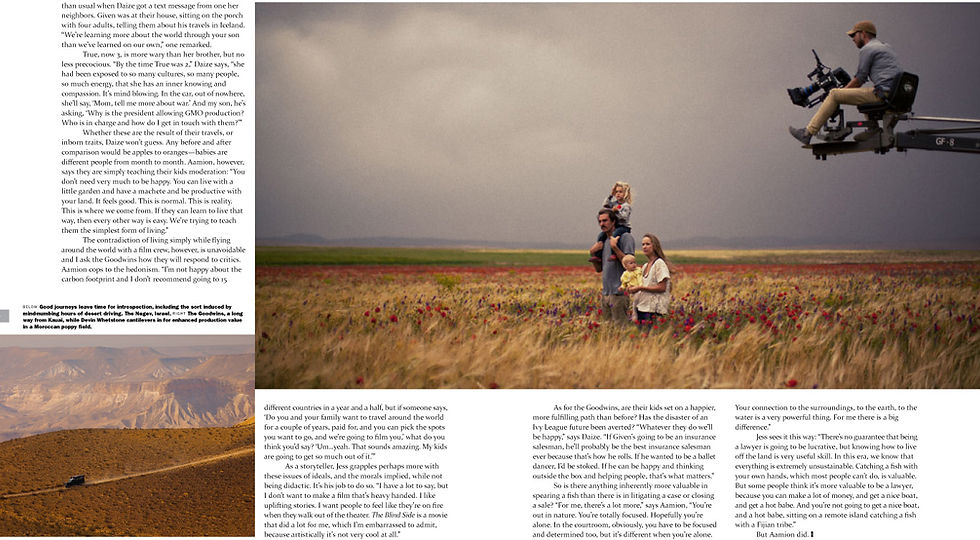

I'm standing on the thin side of a 2x4, which is screwed to a tree 30 feet off the ground in Aamion Goodwin's yard on Kauai. A spaghetti bowl of exposed roots, angled woodcuttings, metal brackets and dropped screws sits below. Jay Nelson, tree house builder extraordinaire, and Dan Malloy stand on branches a few feet away. A large beam needs to be bolted into place from an overhanging limb. As the climber of the group, I can't convince myself to wriggle out there, lean far over the void, and free my hands to do the job. Than Aamion walks across the property.
"How's it going Jay?" he yells up.
Before Nelson can respond, Aamion climbs the tree and sits between us. Nelson looks at the beam. "You want me to do that right now?" Aamion asks as though discussing the need to kill a dangerous animal, and Jay hands him the screw gun.
Aamion shimmies out onto the branch, his lanky arms and legs wrapping the limb for purchase, spare screws in his mouth. Then he pinch-grips the timber into place, makes a blind left-handed stab with the screw gun, and drives three screws to the hilt. Its not a momumental accomplishment, but a small line has been drawn between him and the rest of us. Aamion traverses life beyond such lines.






OUTSIDE THE LINES
In his early twenties, while visiting his parents in Egypt, where they worked in the oil industry, Aamion’s father, Aaron Goodwin, would spend his nights atop the pyramids at Giza. In 1977 they were unguarded and you could simply scramble the 45 stories to the top to enjoy the view. Watching as dawn broke, from the edge of an ancient city rushing toward modernity, Aaron received thoughts of his future and past lifetimes, leaving him, in his words, “expanded with ominous thoughts of an as yet unrevealed mystery.”
Aaron’s own father died later that year, and his son, Aamion, was born the next. Marion Lisnby, Aamion’s mother, and Aaron separated before Aamion’s first birthday. Afterward, Aaron fled what he saw as a society deluded by material excess and detachment from nature. Surfing was the antidote, he thought, along with self-reliance, simplicity, and a faith in a benevolent universe. “I realized the system was not going to awaken me,” he says. “I already understood much more than it could give me. In my last year of college I said, ‘I don’t need this. I am a free man. I can go out and make my living.’ So as I raised Aamion, I knew he was already learning more than anybody could learn at a school. He was traveling the world.”
They landed in a remote village in Fiji where Aamion was raised alongside the local chief’s son. By age 5, he was spending most days unmonitored. “Aamion was a competent man-child in the wild, and for me to worry about him was not a pastime,” says Aaron. As the Goodwins traveled through Fiji, Kauai, and New Zealand, they lived in tree houses, a coastal cave, and Kirpal Singh ashrams on Maui and in Idaho. Travel was funded through odd jobs and the sale of Aaron’s hand-dyed “consciousness t-shirts” as well as other art.
To truly leave society, awed as it may be, is a deeply risky move simply because the social safety net disappears, but Aaron seemed conscious of this gamble and fortune prevailed. Fijian village chiefs proved amenable. Kiwi commune members parented. And for Aamion, magazine covers—Surfer and Vogue Italy—eventually came.
Aaron was pleasantly surprised by their ability to thrive on the road. For Aamion, “adrift in his own precognitive adventures,” as Aaron puts it, this never appeared to be a question. “I knew we were going to be OK,” says Aamion. “It’s like he beat that into my head. If you just surrender and believe we’re going to make that next bill, or get a ride, or find a place to sleep, it just happens. Everything was always easy.”
Aamion is adamant about this, but was it so? Our psyches are elastic, shaped by what we think is real. The Stanford Prison Experiment, a famous psychological study conducted in 1971, notoriously showed that volunteers became monstrous when placed in a simulated prison and tasked with guard duty. (It got so ugly they called it off after six days.) Aaron, however, crafted his own reverse experiment: He dropped his son into a tropical paradise with no authority, no rules, total support, and love. And Aamion created something equally divergent.
This is the Goodwin ethos: total assuredness that nature provides; everything will be cool. Even the family Instagram moniker, @TheGoodwinWay, is doctrinal, and every post admonishes #slowyourselfdown, as though things will be cool for you, too. Aamion approaches life as if things are simply running along as they should, like those surfers who don’t rush their turns, and know that a major part of good surfing is picking good waves and simply standing there, providing a foil for a work of nature spinning at its own leisure.
Now 35, he makes a living as a pro surfer. His wife, Daize (née Shayne) also did until recently, a two-time world longboard champion. While the purchase of board shorts and sunglasses pays the Goodwin’s mortgage, it can be argued that consumerism degrades the natural world their lifestyle depends on. Partly as a countermeasure, partly as a matter of course, they’ve decided to instill Aamion’s heritage in their 6-year-old son, Given, and their 3-year-old daughter, True. Attendant to this process, Aamion’s childhood friend, Jess Bianchi, who is now a filmmaker, has been making a movie about the family. The lm follows the Goodwins as they travel around the globe, imparting Aamion’s culturally diverse upbringing to their children. While watching the footage Bianchi has captured, however, one can’t help but ask if, in a world where characters like Aamion are disappearing, a life like his is destined to fade into myth? Or is it a myth already?
RECONNECTING
Aamion and Jess Bianchi grew up adventuring around Hanalei with the likes of Danny Fuller, Dustin Barca, Keala Kennely, Roy Powers, and the Irons brothers. They’d lost touch when Bianchi’s father, a wealthy businessman who founded an engineering firm that builds oil refineries and airports in Nigeria, sent Jess to TASIS, an aristocratic boarding school in Lugano, Switzerland. When Jess wasn’t invited back to TASIS for being disruptive, he wound up in an apartment on Kauai’s north shore, on his own at 15.
“My dad sent me checks from a distance and that made it OK to be alone,” he says. “I was a fucking wreck, partying too much, because I had nobody telling me what I couldn’t do.”
He later enrolled in film school at the Academy of Art University in San Francisco, where his student films won awards. After graduation, Bianchi worked in film and advertising, as everything from a set production assistant, to a cinematographer, to an editor, under Jeff Linnell, creator of the camera system that was used in last year’s cinematographic triumph Gravity. Until three years ago, he had been working in a San Francisco studio, locked in the editing bay for month-long stretches, making other people’s visions, not his own. Then he went on hiatus in Hawaii and ran into his friends, most of them now pro surfers. “I loved everything about growing up in Hawaii,” he says. “The respect of the aina, the elders. It makes a person with a lot of heart, kind of thickheaded, but a strong person. Most people who come from Kauai are epic characters and bring that with them everywhere they go.”
On Kauai, he found his way to a secret spot, a childhood favorite, and after getting barreled alone, he walked up the beach and ran into the Goodwins. “We talked about where we had arrived in our lives,” he says. “And I told Aamion that if he ever wanted to work on a project, to let me know. Then I went back to San Francisco.”
The Goodwin’s son, Given, was approaching school age and their daughter, True, was soon to be born. Aamion and Daize were planning to spend a year traveling the world at the time, exposing their kids to alternative cultures— like Aaron had for Aamion—in order to bring them back inoculated against 9 to 5 normalcy. There was also a more pragmatic impulse at play since, in pro surfing, irrelevance is death. Livelihoods are determined by winning contests of subjectivity—whether in heats or by garnering internet popularity. Aamion, however, doesn’t surf in contests, and you also won’t see him scrambling to put out web clips. Despite this, and his father’s anti-consumerist parenting, he still manages to support his family, paid by a company that leverages his barefooted reef walking and 100-foot free-dives for their brand image.
The upside of his Faustian bargain is that he can be off the grid for long stints, as long as he brings a camera. Ever the hunter, he is keen to opportunity and, with the internet awash in 60-second GoPro clips, he realized that embarking on a three-year film project would be like spearing a big fish. The concept was relatively simple: Jess would make a movie about the Goodwins’ travels as they attempted to raise their son and daughter with the same values Aaron had instilled in Aamion during his upbringing.
For Jess, the project would also be a personal journey. “I’m the opposite of Aamion,” he says. “That’s why I wanted to make the movie. My dad grew up poor, so he chased money and sacrificed my upbringing. Aamion’s father was always about love and guiding him through life, and Aamion has become a very confident guy as a result. I wanted to learn from his world, and then somewhere we both started learning from each other. I think that’s one thing that makes our relationship for this film so great. It’s these opposite worlds colliding.”
Inspired to execute his own vision, Jess put up a major portion of his inheritance and jumped in. Working with the Goodwins, they planned a 15-month itinerary that would take them to 15 countries. “We didn’t have any investors,” Jess says. “No one would fund this project unless we put logos all over it. And I knew it was something way bigger than I had ever dealt with. Then out in the field, I also realized, fuck, I don’t know anything about anything. We only made it to a couple countries before it almost ended. Shit got real in Ireland really quick. But I got better as a director, and at time management, and dealing with everyone’s personalities.” He laughs. “And on top of that, trying to be creative.”
THE FILM
Thirty seconds into the sequence of Daize giving birth, it’s clear this may not be a surf movie at all. A placid scene of an extremely pregnant Daize gently dancing in the family garden as she enjoys what most women would scarcely recognize as labor quickly turns into very real childbirth. It’s a galaxy apart from the typical Kai Neville release.
The film was shot over 14 months and, as of this writing, has been edited to the point of a rough cut. It was meant to document the Goodwins’ travels and their approach to life, though Bianchi admits it is not purely documentary. There are also directed moments where Jess felt it expedient to the story.
While the film covers a lot of ground in two and a half hours, it also slows down in segments, drenching the viewer with detail: True’s tiny knees hitting the ground as she first crawls in Thailand. Aamion’s hand slowly twisting around a jungle branch hit by a shaft of light. Long, uncut shots with no music or dialogue, just birds, running water, wind. Lush helicopter shots providing dot-in-the-landscape perspective.
The film is sensual, and many shots are bathed in such handsome natural light it seems the golden hour lasts all day. There’s a repetitive portrayal of putting on wetsuits, waxing boards, walking barefoot. These basic acts seem ritualized as a physical observance, preparing one to enter the ocean. Nevertheless it’s not a surf film. While there are a few choice tubes rides and walks to the nose by the Goodwins, this is mostly a study of humanity, and a personal manifesto. “Baraka, The Endless Summer, and The Motorcycle Diaries were huge in influences,” says Jess, “It’s about the concept of being on the road and growth on the road.”
But will people in Toronto with office jobs relate to these sun-kissed, Bohemian, road trippers? “You can see that they’re just like any other family,” says Jess. “They make dinner, they go shopping. I mean they’re different,” he says with a laugh, “but True’s birth is a big connection. It’s such a human moment. From then on, you’re slightly attached to the child. She becomes like everyone’s baby and we get to watch True grow in all these different environments where she’s collecting different experiences.”
THE SIMPLEST FORM OF LIVING
The trip is over and the Goodwins have been home for a year. The other day, Given, now 6, was playing beyond sight in the yard with his machete. He’d been gone for longer than usual when Daize got a text message from one her neighbors. Given was at their house, sitting on the porch with four adults, telling them about his travels in Iceland. “We’re learning more about the world through your son than we’ve learned on our own,” one remarked.
True, now 3, is more wary than her brother, but no less precocious. “By the time True was 2,” Daize says, “she had been exposed to so many cultures, so many people, so much energy, that she has an inner knowing and compassion. It’s mind blowing. In the car, out of nowhere, she’ll say, ‘Mom, tell me more about war.’ And my son, he’s asking, ‘Why is the president allowing GMO production? Who is in charge and how do I get in touch with them?’”
Whether these are the result of their travels, or inborn traits, Daize won’t guess. Any before and after comparison would be apples to oranges—babies are different people from month to month. Aamion, however, says they are simply teaching their kids moderation: “You don’t need very much to be happy. You can live with a little garden and have a machete and be productive with your land. It feels good. This is normal. This is reality. This is where we come from. If they can learn to live that way, then every other way is easy. We’re trying to teach them the simplest form of living.”
The contradiction of living simply while flying around the world with a lm crew, however, is unavoidable and I ask the Goodwins how they will respond to critics. Aamion cops to the hedonism. “I’m not happy about the carbon footprint and I don’t recommend going to 15 different countries in a year and a half, but if someone says, ‘Do you and your family want to travel around the world for a couple of years, paid for, and you can pick the spots you want to go, and we’re going to film you,’ what do you think you’d say? ‘Um...yeah. That sounds amazing. My kids are going to get so much out of it.’”
As a storyteller, Jess grapples perhaps more with these issues of ideals, and the morals implied, while not being didactic. It’s his job to do so. “I have a lot to say, but I don’t want to make a film that’s heavy handed. I like uplifting stories. I want people to feel like they’re on fire when they walk out of the theater. The Blind Side is a movie that did a lot for me, which I’m embarrassed to admit, because artistically it’s not very cool at all.”
As for the Goodwins, are their kids set on a happier, more fulfilling path than before? Has the disaster of an Ivy League future been averted? “Whatever they do we’ll be happy,” says Daize. “If Given’s going to be an insurance salesman, he’ll probably be the best insurance salesman ever because that’s how he rolls. If he wanted to be a ballet dancer, I’d be stoked. If he can be happy and thinking outside the box and helping people, that’s what matters.”
So is there anything inherently more valuable in spearing a fish than there is in litigating a case or closing a sale? “For me, there’s a lot more,” says Aamion, “You’re out in nature. You’re totally focused. Hopefully you’re alone. In the courtroom, obviously, you have to be focused and determined too, but it’s different when you’re alone. Your connection to the surroundings, to the earth, to the water is a very powerful thing. For me there is a big difference.”
Jess sees it this way: “There’s no guarantee that being a lawyer is going to be lucrative, but knowing how to live o the land is very useful skill. In this era, we know that everything is extremely unsustainable. Catching a fish with your own hands, which most people can’t do, is valuable. But some people think it’s more valuable to be a lawyer, because you can make a lot of money, and get a nice boat, and get a hot babe. And you’re not going to get a nice boat, and a hot babe, sitting on a remote island catching a fish with a Fijian tribe.”
But Aamion did.